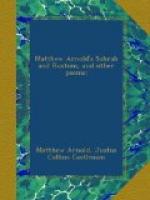They marked off the lists, and, mounted on their powerful horses, fought first with javelins, then with swords, clubs, and bows and arrows. After several hours of fighting both were exhausted, and by tacit consent they retired to opposite sides of the lists for rest. When the combat was renewed, Sohrab gained a slight advantage. A truce was then made for the night, and the warriors returned to their tents to prepare for the morrow.
With daybreak the struggle was renewed. To prevent the armies from intervening or engaging in battle, they were removed to a distance of several miles. Midway between, Sohrab and Rustum met in the midst of a lonely, treeless waste. More convinced than before that his adversary was Rustum, Sohrab sought to bring about a reconciliation, but Rustum refused. This time they fought on foot. From morning till afternoon they fought, neither gaining any decided advantage. At last Sohrab succeeded in felling Rustum to the earth, and was about to slay him, when the Persian called out that it was not the custom in chivalrous warfare to slay a champion until he was thrown the second time. Sohrab, generous as brave, released his prostrate foe; and again father and son parted. [154]
Rustum, scarcely believing himself alive after such an escape, purified himself with water, and prayed that his wounds might be healed and his accustomed strength restored to him. Never before had he been so beset in battle.
With morning came the renewal of the combat, both champions determining to end it that day. Late in the evening Rustum, by a supreme effort, seized Sohrab around the waist and hurled him to the ground. Then, fearing lest the youth prove too strong for him in the end, he drew his blade and plunged it into Sohrab’s bosom.
Sohrab forgave Rustum, but warned him to beware the vengeance of his father, the mighty Rustum, who must soon learn that he had slain his son Sohrab. “I went out to seek my father,” cried the dying youth, “for my mother had told me by what tokens I should know him, and I perish for longing after him.... Yet I say unto thee, if thou shouldst become a fish that swimmeth in the depths of the ocean, if thou shouldst change into a star that is concealed in the farthest heaven, my father would draw thee forth from thy hiding-place, and avenge my death upon thee, when he shall learn that the earth is become




